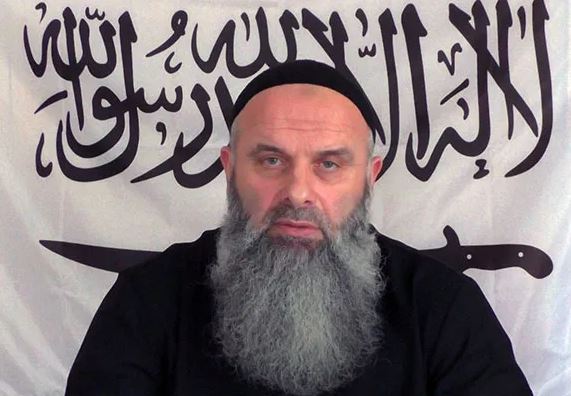
Taliban’s Return to Power Draws Mixed Reaction From Chechen Factions
Taliban’s Return to Power Draws Mixed Reaction From Chechen Factions
As the United States military completes its retreat from Afghanistan, Russia, despite its own humiliating 1989 exit from the war-torn country, has been gloating (see EDM, August 19), apparently hoping to expand its influence in the region and fill the power vacuum left by the Western coalition. In recent years, the Russian government established working contacts with the Taliban, a movement it still formally labels a terrorist group (Fsb.ru, June 25). Over the summer, Russia’s top diplomats have praised the Taliban fighters’ conduct, calling them “rational people” (RIA Novosti, July 23), and claimed Kabul under Taliban control was “stabilizing.” This is a far cry from the messages Moscow used to send to the Taliban leadership around the turn of the 21st century, when Russia backed the movement’s regional rivals and openly threatened to bomb its Afghan bases (Nezavisimaya Gazeta, June 2, 2000). Today, it appears the Kremlin has gone all in on the group. But it remains to be seen whether the gamble will pay off considering that, historically, the Taliban never tried to curry favor with Moscow and was not exactly accommodating to Russian interests.
Perhaps the biggest snub to the Kremlin came in early 2000, in the form of the Taliban’s recognition of the Chechen Republic of Ichkeria, Russia’s breakaway territory (see Monitor, January 18, 2000). The Ichkerian separatists were particularly elated over the fact that the recognition came straight from Mullah Omar, the one-eyed figurehead of the Taliban, whose physical impairment evoked in their minds historical analogies with Baysangur of Beno, the one-eyed, one-armed and one-legged hero of the Caucasus’s resistance to tsarist imperialism in the 19th century.
It is these historical factors that best explain why the current Chechen leader, Ramzan Kadyrov, reacted so nervously to the Taliban’s triumph in Afghanistan (YouTube, August 16, 2021). “I think America has devised another scam against Muslims,” the Moscow-backed strongman said in an Instagram stream commenting on the US pullout from Afghanistan. “They said they would never get out of there, and now they have left everyone behind and run away.” In a departure from the official government line, Kadyrov maintained that the Taliban, just like former al-Qaeda leader Osama Bin Laden before them, was “an American project” that apparently poses a threat to Russia. “That is why we, and our allied nations, need to strengthen our borders and be prepared for the worst. It is not a problem for us; we will stop anyone who threatens our state, our sovereignty and our people,” he assured his audience, never passing on the chance to boast. Kadyrov had advice for Central Asian states too. “Our brothers Uzbeks, Tajiks, Kyrgyz and Turkmens should be vigilant. The territories that border Afghanistan are in danger now. That is what the Americans wanted,” he claimed.
Not everyone in the Chechen officialdom shares such a grim view of the Taliban. Kadyrov’s own advisor on religious affairs, Adam Shakhidov, praised the Islamist Afghan movement’s successes in an Instagram comment, attributing them, somewhat cryptically, to the Taliban’s Maturidi-Hanafi creed, although he did not go into details. Shakhidov later deleted his post, whose screenshot has been making the rounds on social media (T.me/IADAT, August 18), but never disavowed it (Instagram.com, August 15).
By contrast, secular Chechen nationalists took a more cautious, even suspicious tone, voicing their concern about “growing tensions” in Afghanistan and “possible violations of fundamental human rights by paramilitary radical groups.” “We expect that the new leadership of Afghanistan will adhere to the norms that our Prophet (peace be upon Him) demonstrated when he captured the pious Mecca, for this is an example of justice and the height of mercy for Muslims,” the statement signed by the exiled head of the Chechen separatist government, Akhmed Zakayev, reads. The statement also calls for a “compromise” in order to achieve “long-lasting peace in your country” (Chechenpress, August 17).
The most enthusiastic reaction to the Taliban’s return to power came from the Caucasus Emirate, the divided and weakened pan-Caucasus militant group that was created in 2007 by Chechnya’s top commander Doku Umarov. The Chechen wing of the Caucasus Emirate issued a statement congratulating “the Islamic Emirate of Afghanistan, the Mujahideen and all Muslims of Afghanistan on a great, historic victory.” “The Chechen people will never forget that Afghanistan became the first and only Islamic state to recognize the independence of Chechnya, and they sincerely rejoice at the success of their brothers and wish the Islamic Emirate of Afghanistan to become an example and support for the fighting Ummah [community] of Muslims,” the Amir of Vilayat Nokhchicho, Abu Hamza (Ahmad Umarov), says in the statement. Abu Hamza, the only surviving brother of the late Doku Umarov, continues, “Today, Chechnya, as well as the entire Caucasus, is under the occupation of Russia… But our struggle […] will continue […] until a complete victory and the restoration of Sharia in our land” (Checheninfo.com, August 19).
The Taliban’s sweep to power in Afghanistan clearly boosted the morale of the North Caucasus militants. As evidenced by their statement, they are highly likely to seek the movement’s support for their cause (see EDM, August 19, September 7). Whether the Taliban, which is on a charm offensive these days in an effort to improve its image, will be willing to open contacts with the Caucasus Emirate is, of course, an open question. But if the past is any indication, at least some fractions within the movement could well be sympathetic to the agenda that the North Caucasus Islamist fighters are pursuing.


